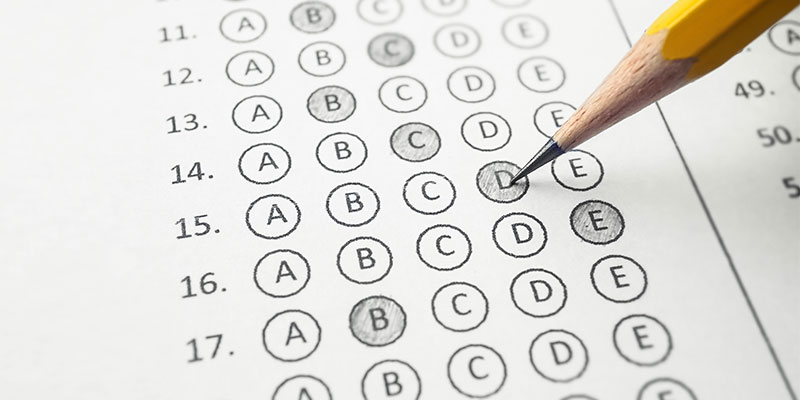PSLE Science focuses more on applying the knowledge acquired theoretically. There are several ways to approach the PSLE science examination, and the first basic rule is to understand the science concepts thoroughly. The other important requirements a student should possess will be:
- To know the strategies for answering the questions.
- Prevent careless mistakes by paying more attention.
An Insight Into Topics in PSLE Science Syllabus
Science subject is introduced to a student when they enter Primary 3. Students learn the subject for four years before taking the PSLE Science examination in Primary 6.
Topics Covered in PSLE Science Syllabus
Students commit a lot of careless mistakes in booklet A and B of the PSLE Science paper, covering the following topics:
- Cycles
- Interactions
- Diversity
- Systems
- Energy
In the article below, let us discuss the mistakes that they commit commonly in both the components and learn how they can be avoided.
Common Mistakes Committed in Booklet A With Hard PSLE Science Questions
Booklet A is only multiple-choice questions (MCQ) and is the easiest segment of the PSLE Science paper. Though answers are already provided, and students have to pick the right one, the questions are usually deceptive and tricky. If the child is not thorough with science knowledge, there are a lot of possibilities to get confused and commit careless mistakes. Students must be meticulous and alert if they wish to ace the PSLE Science MCQ section. Here we have consolidated a few of the common mistakes students commit and tips on overcoming them.
1. Spending a Lot of Time in Section A
It is quite natural for students to get stuck in section A when they find it difficult to figure out an answer as it has tricky PSLE Science questions. But you have to teach your child not to spend more than 45 minutes in section A. As section B contains open-ended questions which are not straightforward, they will require brainstorming and, eventually, more time to answer.
2. Rushing Through Questions
Science questions are usually long. Students may naturally tend to rush through the multiple-choice questions to save time. When they do so, and when the questions are slightly twisted, they might miss noticing the keywords and choose the wrong answer. Thus, you have to train them to pay more attention to the multiple-choice questions and make them double-check whether the other options apart from the right answer are irrelevant to the question.
3. Assuming & Picking Wrong Answers
In most cases, students assume the meaning of a question by looking at its diagram. When they don't read the question completely, they will pick the wrong answer. Students need to understand the question completely before choosing the right answer.
To achieve success in PSLE exams, your child needs in-depth knowledge and intense practice. Using StudySmart's PSLE module, students can learn the PSLE syllabus, practice exam strategies, and attempt challenging questions. You can also browse our apps here: PSLE English, PSLE Maths, PSLE Science.
Ways to Overcome Common Mistakes in Booklet A
The ways to avoid the common mistakes in booklet A include:
- Read the question carefully and then answer by paying more attention and highlighting important keywords.
- Check and cross-verify whether the other options provided apart from the one selected are wrong.
- Prevent assumptions and read through the entire question with good concentration.
- Save time by moving on to the next section when multiple-choice questions consume more time. It is possible to come back to section A after completing the remaining sections and finish it using the leftover time.
- Practice multiple choice questions with previous year's exam papers to get used to the actual exam scenario.
Also Read : Ways to Ace PSLE Science Questions on Energy & Force
Common Mistakes Committed in Booklet B With PSLE Science Challenging Questions
Booklet B in PSLE Science contains open-ended questions that evaluate students' understanding and thinking skills. It is not possible to score high marks in booklet B by merely grasping concepts and recalling knowledge. A student must have a strong foundation in science to ace this segment, as the questions posed in this section are inclined to testing higher-order thinking skills. Let us discuss how to avoid the common mistakes in open-ended questions and score better.
1. Skipping Key Information
The PSLE science questions in booklet B are either misleading or tricky to make students pay more attention and think deeply. Most of the students do not have the patience to spend time and read long questions. When they skip the key information or certain terms in the question, they start assuming things and provide wrong or insufficient answers.
2. Giving Generalised Answers
A few students do not give precise answers. Without mentioning the key concept, the student will not be able to score high. PSLE Science tries to assess students by checking how they use concepts in real-life situations. Thus, students have a responsibility to read every question carefully, analyse what is expected of them, and use different skills to answer them.
3. Ignoring Diagrams, Charts & Graphs
A few students have poor skills in analysing graphs and charts. There are some children who ignore the diagram, charts, and graphs completely in their hurry to answer the question. While another crowd forgets to link the information from the graph to the question.
4. Failing to Use Strategies
Students waste their time in the examination by staring at the question paper for a long duration. They let precious time slip away without knowing how to answer as they do not know how to use strategies. There are cases where students don't have sufficient knowledge of the concepts provided in the questions and feel lost during the examination.
5. Missing Keywords
The subject of science is all about keywords. When students use general words rather than keywords, they are marked wrong as the terms do not mean the same in a science context. Examiners think that the students are unclear about the concept or do not have adequate knowledge about the topic when they miss keywords or provide incomplete answers.
6. Leaving Blank Spaces
When students are not confident about the answer, they choose to leave the space blank. This proves that they lack knowledge in that particular topic. Leaving a blank must never be a choice. You have to make your child understand that they will never learn if they don't try.
Ways to Overcome Common Mistakes in Booklet B
The ways to avoid the common mistakes in booklet B include:
- Slow down and read the questions with more care.
- Check for important clues in the question to give a precise answer.
- Practice more to identify the concepts expected.
- Apply data from the graph and answer the question with higher-order skills.
- Have a strong foundation in basic science knowledge and concepts.
- Grasp keywords by doing more homework and practicing previous year's exam papers.
- Familiarise your child with scientific definitions and terms.
- Eliminate exam anxiety and stress by preparing well in advance. Being thorough with the concepts is the key to combating unnecessary fears.
- Use associative memory to remember information. This technique will help your child avoid committing mistakes.
- Answer the remaining questions during a blanked-out phase instead of getting stuck with a segment.
Wrap Up
To sum up, PSLE Science exposes students to various new terms that they usually do not use in daily life. It is a complex subject. However, identifying and preventing mistakes is useful to score better in the exam. It is the responsibility of the parent to identify the weakness of their child and help them minimise committing those mistakes. Furthermore, to improve the PSLE science score, students must develop critical thinking, problem-solving and inferential skills. Study Smart Singapore is a personalised education platform that helps to prepare students for PSLE examinations. It is built with Artificial Intelligence and offers free trial versions, which will be beneficial for checking the learning resources before subscribing to the platform.

